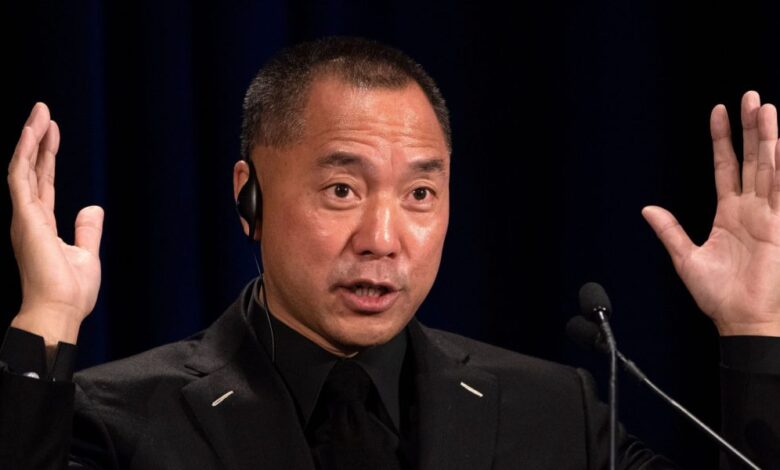Guo Wengui convicted of years of fraud, defrauding loyal fans


Guo Wengui, an exiled Chinese business tycoon who criticized the Communist Party and won a large online following and powerful friends in the U.S. conservative movement, was convicted by a U.S. jury on Tuesday of participating in a massive, years-long fraud that defrauded some of his most loyal fans.
Once considered one of China’s richest men, Guo was arrested in New York in March 2023 and charged with running an extortion business that ran from 2018 to 2023.
During a seven-week trial, he was accused of defrauding thousands of people into investing in fake investments and using the money to support a lavish lifestyle. He was convicted of nine of 12 criminal charges, including conspiracy to commit extortion.
Guo’s lawyer said prosecutors failed to prove he defrauded anyone. One of his lawyers declined to comment after the verdict.
In a statement after the verdict, U.S. Attorney Damian Williams said Guo’s related fraud schemes “were all designed to extort money from his loyalists so that Guo could spend his days in his 50,000-square-foot mansion, drive his $1 million Lamborghini, or relax on his $37 million yacht.”
“Guo’s thousands of online followers were exploited so that Guo could live a lavish life,” he added.
Guo, also known as Miles Kwok, left China in 2014 during an anti-corruption crackdown that saw many close to him arrested, including a senior intelligence official.
Chinese authorities have charged him with rape, kidnapping, bribery and other crimes, but Guo says the charges are false and intended to punish him for publicly exposing corruption as he criticized leading figures in the Communist Party.
He applied for political asylum in the United States, moved into a luxury apartment overlooking Central Park and joined former President Donald Trump’s Mar-a-Lago golf club in Florida.
While living in New York, Guo developed a close relationship with former Trump political strategist Steve Bannon. In 2020, the two announced a joint initiative to overthrow the Chinese government.
Prosecutors said hundreds of thousands of people were convinced to invest more than $1 billion in entities controlled by Guo. Those businesses and organizations included Guo’s media company, GTV Media Group Inc., and his so-called Himalaya Farm Alliance and Himalaya Exchange.
In his closing argument, Assistant U.S. Attorney Ryan Finkel said Guo “blatantly lied to trick his followers into giving him money.”
Guo has made hundreds of broadcasts and videos in which he promises his followers that they won’t lose money if they invest with him, he said.
“I am rich. I will take care of you,” prosecutors said Guo told them.
Guo later said he spent millions of dollars from investors to fund a lavish lifestyle for himself and his family, including a $1.1 million tortoiseshell jewelry box and several candlesticks, a $1 million chandelier, a $36,000 mattress, a $40,000 coffee table and a $250,000 antique rug, items that were kept at a family home in Mahwah, New Jersey.
Defense attorney Sidhardha Kamaraju told the jury that prosecutors had presented a case that was “long-winded but lacking in detail, full of talk but lacking in evidence.”
Kamaraju said Guo was the “founder and face” of a pro-China democracy movement that has attracted thousands of dissidents. Kamaraju urged the jury to consider whether Guo intentionally defrauded other members of the movement out of money. He said prosecutors had failed to prove that “Mr. Guo took a single cent with the intent to undermine a political movement in which he had invested so much.”
The lawyer did not deny that his client lived lavishly, with a luxury apartment occupying an entire floor in Manhattan; a home in Greenwich, Connecticut; a yacht and a jet. But he said prosecutors wanted the jury to make “leaps of logic” to find Guo guilty.
“It’s not a crime to be rich,” Kamaraju said. “It’s not a crime to live lavishly or spend money on nice things. It’s not a crime to have a yacht or a jet or wear a nice suit. It may not be our lifestyle. It may be weird. It may even make some people uncomfortable, but it’s not a crime.”
Prosecutor Finkel said everyone agreed that Guo was a target of the Chinese Communist Party, but that did not give Guo “a license to rob these people.”
Finkel said Guo also created a “blacklist” of his enemies and posted their personal information online. When the Securities and Exchange Commission investigated him, Guo staged protests against the agency, claiming it was infiltrated by the Chinese Communist Party. And when a bankruptcy trustee was appointed by a judge to represent Guo’s creditors, Finkel said Guo’s followers protested outside the bankruptcy trustee’s children’s homes and outside an elementary school where one of them taught.




